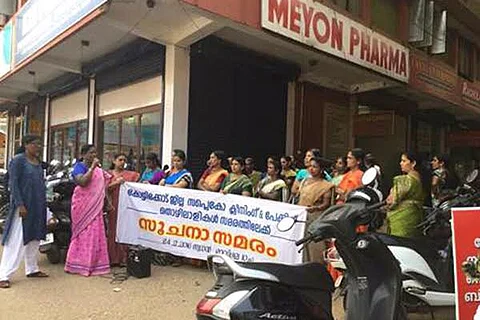

A public meeting to discuss the rights of women in the unorganised sector, and two street plays to highlight the same - Penkoottu’s Women’s Day programmes on Wednesday are deceptively simple.
But the work that the organisation has done in Kerala over the years is tremendous. Born in 2009, Penkoottu - the companionship of women - is a collective that works for the rights of working women. It was launched to address one specific issue: Women working in the shops of Kerala, especially in SM Street in Kozhikode, popularly known as Mithai Theruvu, did not have safe toilet facilities.
The trigger for their strike - Moothrappura Samaram - was an incident at a public pay-and-use toilet in the street. A woman was stopped from using the facility because she did not have change. When she tried to force her way through, she was dragged to the office of the manager and insulted. And it didn’t stop with the insults - the police then filed a case against her, accusing her of using casteist insults. Angered by this incident, women workers striked.
Moothrappura Samaram was the first protest of its kind in Kerala. And from the word go, they faced severe opposition. They were insulted for striking, and asked why women needed to come to work if they wanted to pee.
“Most of them men started looking at the protesters like untouchable people,” says P Viji, a tailor who was in the forefront when Penkoottu was formed. “The fact that the traders organisations were against the demand, as most of the shops were owned by its members, made things tougher for us. The men were of the view that only women who are not civilized would raise such demands,” Viji says.
But refusing to give up, Penkoottu formed an action committee, which included members from several organisations like the feminist group Anveshi, the Muslim women’s organisation Nisa, some activists of the Mahila Congress, and independent activists. They negotiated with traders’ unions, and through sheer force of will, they managed to get the attention of the media - and in turn, the corporation officials. The corporation agreed to ensure that available toilets were made ready to use, and also to build 10 new toilets in the area.
Moothrappura Samaram paved the way for setting up e-toilets across the state. The protest sensitised society to the fact that women need safe toilets in workplaces. Soon, Penkoottu formed Ashangatitha Meghala Thozhilali Union (AMTU) which worked for the rights of unorganised sector employees. And their next big fight was for the rights of saleswomen in textile showrooms to sit during working hours.
On the International Women’s Day 2014, AMTU gave notice to employers of some textile showrooms in Kozhikode, asking them to ensure the right to sit for sales women. On May Day they began a protest in front of some textile showrooms as the employers didn’t approve the demand. The state then witnessed another unprecedented protest in which women workers sat in front of the showrooms till their demand was met. The protest was known as Irikkal Samara - the protest for the right to sit.
“Both the protests began when women working in the shops approached me with complaints. Some of them were friends,” says Viji. “Some like minded women and I then formed Penkoottu in 2009. Moothrappura Samaram was not very organised in the beginning, but after two months, it became more intense.” “It was only after around six months later that e toilets were set up, and the protest in various forms continued till then,” Viji explains.
“By the time Irikkal Samaram started, we had launched AMTU as well and it reflected the strength we had acquired over the years. It took sixty days for the employers to approve the demand of Irikkal Samaram,” Viji said. Moothrappura Samaram and Irikkal Samaram were instrumental in sensitising the people of Kerala about the basic needs of women workers in the unorganised sector in a society which is known as literate and socially aware.
“Women labourers were started being treated as human beings with rights after the protests. Before that there was no such consideration at all. Most important was that the women workers started sharing their problems with us. Penkoottu was formed for Moothrappura Samaram and AMTU as a more formal platform. Now AMTU has more than 6,000 members including men from various parts of the state,” Viji, a native of Kozhikode, told TNM.
The latest protest by AMTU was when female nurses of a private hospital in Kozhikode were sacked without a reason two months ago. The hospital management revoked the decision following the protest led by the organisation. Last year in August, ATMU also took up the issue of the Kerala State Civil Supplies Corporation (Supplyco) packing labourers as they were deprived of rightful wages.
“We don’t claim that the protests were a complete success,” says Viji, “but they helped to reduce the mental torture women of unorganised sector were subjected to at workplaces.”